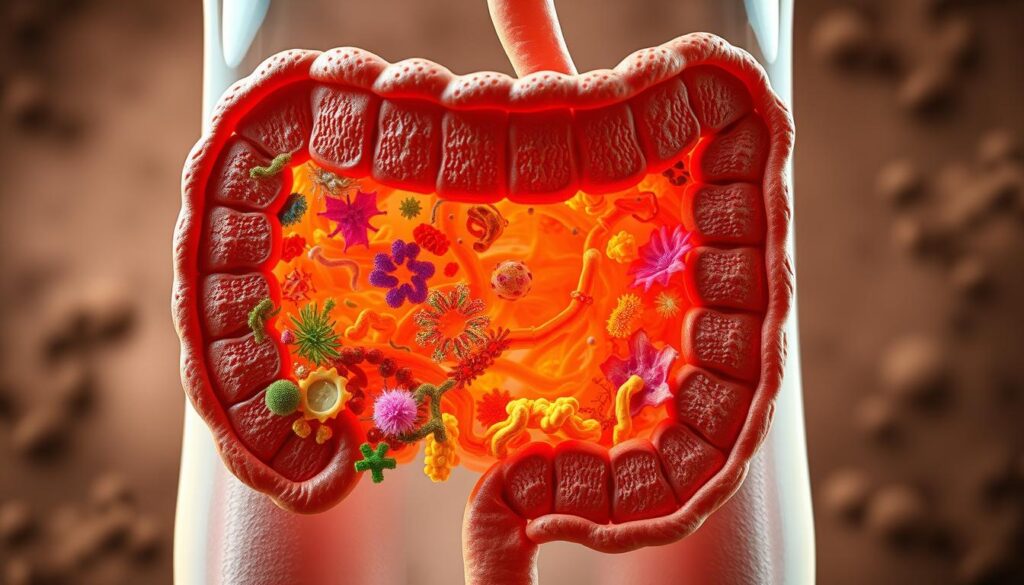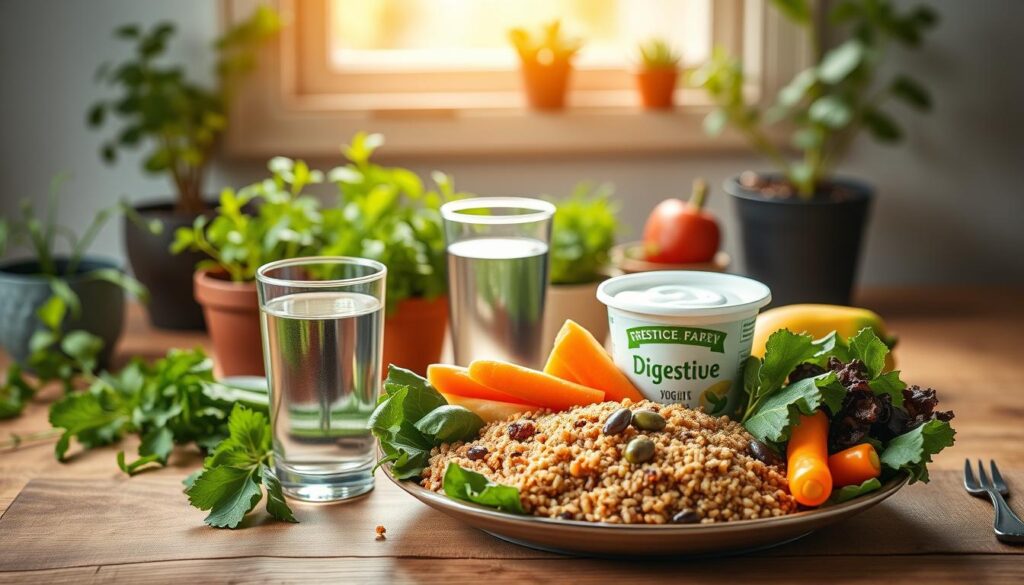Improve Your Digestion with These Tips
Good digestive health is key to feeling great. When your digestive system works well, you feel…

Good digestive health is key to feeling great. When your digestive system works well, you feel more energetic and focused. Eating foods rich in fiber, healthy fats, and nutrients helps keep your system healthy.
Eating whole foods is a big step toward better digestion. By choosing the right foods, you can control your digestive health. Simple diet and lifestyle changes can make a big difference in how you feel.
Key Takeaways
- Focus on consuming a balanced diet rich in fiber and nutrients.
- Make informed choices about the food you eat to support digestive health.
- Simple lifestyle changes can significantly improve digestion.
- A healthy digestive system is vital for overall well-being.
- Improving digestion can boost energy levels and overall health.
Understand the Digestive Process
The digestive process is a complex series of events. It turns the food you eat into nutrients your body can use. Many organs work together to break down food into essential nutrients.
What Happens During Digestion?
Your body breaks down food into smaller molecules during digestion. This starts in the mouth, where teeth grind food into smaller pieces. Saliva with enzymes like amylase starts to break down carbohydrates.
When you swallow, food goes into the stomach. Gastric juices break it down further. The stomach’s digestive enzymes and acids liquefy food into a mixture called chyme.
This chyme then goes into the small intestine, where most nutrient absorption happens. The small intestine has finger-like projections called villi. These increase the surface area for absorption. The remaining waste goes into the large intestine, where water is absorbed, and waste is prepared for elimination.
Key Organs Involved in Digestion
Several key organs play a big role in digestion. These include:
- The mouth, where digestion starts with the mechanical breakdown of food and the action of saliva.
- The esophagus, which moves food to the stomach through peristalsis.
- The stomach, where gastric juices break down food into chyme.
- The small intestine, where most nutrient absorption occurs.
- The large intestine, which absorbs water and compacts the remaining waste.
- The liver and pancreas, which produce bile and digestive enzymes, respectively, to aid in digestion.
Knowing how each organ works in digestion helps us appreciate our body’s ability. By eating well and living healthy, we can improve our digestion and overall health.
Importance of a Healthy Gut
A healthy gut is key for optimal digestion and health. It affects your digestion and immune system.

Keeping your gut balanced is important. It helps with digestion, immunity, and hormones. The trillions of microorganisms in your gut work together. They help break down and absorb nutrients.
How Gut Health Affects Overall Wellness
Gut health greatly affects your wellness. A balanced gut helps digest food and absorb nutrients. It also helps make vitamins.
A healthy gut also boosts your immune system. It makes antibodies and activates immune cells.
The gut and brain talk to each other. This connection affects your mood and thinking. It impacts your overall health.
The Role of Gut Flora
Gut flora is vital for a healthy gut. The different microorganisms in your gut do many jobs. They ferment carbs, make short-chain fatty acids, and control the immune system.
To promote a healthy gut, eat a balanced diet. Include fiber, polyphenols, and other nutrients. Add fermented foods, prebiotics, and probiotics to your meals. This helps keep your gut balanced and improves your health.
Eat a Balanced Diet
Eating a balanced diet is simple and very effective for your digestive system. A diet full of important nutrients keeps your gut healthy. It makes sure your digestive system works right.
Fiber-Rich Foods
Fiber-rich foods are key for good digestion. They help your bowel movements stay regular and stop constipation. Good sources are whole grains, legumes, and some veggies.
Benefits of a High-Fiber Diet:
- Promotes regular bowel movements
- Supports healthy gut bacteria
- Helps manage blood sugar levels

Benefits of Fruits and Vegetables
Fruits and veggies are full of fiber and vitamins. They’re good for your health. Eating lots of them can lower the chance of digestive problems and keep your gut healthy.
Try to eat different colors of fruits and veggies. This way, you get lots of nutrients. Eating both raw and cooked fruits and veggies is best for getting all the good stuff.
By eating a balanced diet with lots of fiber, fruits, and veggies, you can really boost your digestive health. And you’ll feel better overall.
Stay Hydrated
Drinking water helps your body digest food better. It breaks down food and helps absorb nutrients. Without enough water, your body can’t work right, causing digestive problems.

Water Intake Recommendations
Experts say to drink at least eight 8-ounce glasses of water daily. But, your needs might change based on your age, sex, weight, and how active you are. You can also get water from other drinks and foods, like fruits and veggies.
Tips for Staying Hydrated:
- Drink a glass of water when you wake up.
- Carry a water bottle with you all day.
- Eat foods that help you stay hydrated, like watermelon and cucumbers.
Recognizing Dehydration
Dehydration shows up in different ways, like dark urine, feeling very tired, and dizzy. If you see these signs, drink water right away. Severe dehydration can cause serious health problems, so it’s important to act fast.
Signs that you need to drink more water:
- Dark yellow or amber-colored urine
- Feeling tired or sluggish
- Experiencing headaches or dizziness
Drinking enough water helps your body stay healthy and your digestive system work better. Make sure to drink water often to keep your body in top shape.
Mindful Eating Practices
Mindful eating is a great way to boost digestion and feel better. It helps you be more aware of how you eat. This can make your gut healthier and improve digestion.

Slow Down and Chew Thoroughly
Eating fast can hurt digestion. So, try to slow down when you eat. Take small bites and chew well. This simple step can really help your digestion.
Eating slowly lets your body break down food better. This makes it easier to get the nutrients you need. It can make you healthier and reduce digestive problems.
Listen to Your Hunger Cues
It’s important to listen to when you’re hungry. Eat when you’re hungry and stop when you’re full. Don’t eat because you’re bored or upset.
By paying attention to hunger and fullness, you can eat better. This can stop you from eating too much. It helps you eat a balanced diet, which is good for your gut.
Adding mindful eating to your life can really help your digestion. By eating slowly, chewing well, and listening to hunger, you can make your gut healthier. This can improve your overall health too.
Regular Physical Activity
Moving your body every day can make your digestion better. Exercise is good for your heart and helps your digestive system too.
Doing regular physical activity makes your digestive muscles work better. This helps food move through your body. It can stop problems like constipation and bloating. The Mayo Clinic says it also helps your body absorb nutrients better.
How Exercise Aids Digestion
Exercise helps digestion in many ways. It makes blood flow better to your digestive organs. This helps break down and absorb nutrients.
It also makes your intestines move food better. A gastroenterology expert says, “Exercise is a great way to improve your digestive health.”
It can also make symptoms of irritable bowel syndrome (IBS) and other digestive problems better.
Best Types of Exercises for Digestive Health
Not all exercises are good for your digestion. Aerobic exercises like walking, running, and cycling are best. They help your circulation and digestion.
Yoga and Pilates are good too. They help reduce stress, which can hurt your digestion.
- Aerobic exercises like walking and cycling
- Yoga and Pilates for stress reduction
- High-intensity interval training (HIIT) for improved circulation
Adding these exercises to your daily life can significantly improve your digestive health and overall well-being.
Manage Stress Levels
You can make your digestive health better by managing stress well. Stress can really hurt your digestive system. It can cause problems like irritable bowel syndrome (IBS), acid reflux, and stomach ulcers.
Impact of Stress on Digestion
When you’re stressed, your body goes into “fight or flight” mode. This means less blood goes to your digestive system. This can slow down digestion and make you feel uncomfortable.
Common effects of stress on digestion include:
- Abdominal pain
- Bloating and gas
- Changes in bowel movements
- Nausea and vomiting
Effective Stress Reduction Techniques
There are many ways to manage stress and help your digestive health.
Here are some effective methods:
- Meditation and deep breathing exercises
- Regular physical activity, such as yoga or walking
- Progressive muscle relaxation
- Mindfulness practices
Using these techniques every day can help reduce stress. It also helps keep your gut healthy.
Incorporate Probiotics into Your Diet
Eating foods rich in probiotics helps keep your gut healthy. This is key for feeling your best. Adding probiotics to your meals can really help your digestive health.
Foods Rich in Probiotics
Many fermented foods are full of probiotics. You can easily add them to your diet. Here are some great sources:
- Yogurt, with live and active cultures
- Kefir, a fermented milk drink
- Sauerkraut, fermented shredded cabbage
- Kimchi, a Korean side dish from fermented veggies
- Miso, a fermented soybean paste
These foods give you probiotics and lots of vitamins and minerals. They help with optimal digestion habits.
Benefits of Probiotics for Digestion
Probiotics do a lot for your digestion. They keep your gut flora balanced. This is important for:
- Breaking down and absorbing nutrients well
- Lessening IBS symptoms
- Boosting your immune system
- Making vitamins
Adding probiotics to your diet brings these benefits. It can make your digestive health better, following good digestive health tips.
To make your digestion even better, try healthy habits too. Eat well, exercise, and drink enough water. This mix can really boost digestion with diet and lifestyle.
Limit Processed Foods
A key step in improving digestion naturally is to limit your intake of processed foods. These foods are often high in unhealthy fats, sugars, and sodium. This can harm your digestive health.
Eating too much of these foods can cause bloating, gas, and irregular bowel movements. This is because they lack essential nutrients and fiber. Your body finds it hard to digest them.
Navigating the Risks of Processed Foods
Processed foods have additives and preservatives that can harm your gut flora. These substances can upset the balance of good bacteria in your digestive system. This can lead to health problems.
- Artificial sweeteners and colors can cause digestive discomfort.
- High sodium content can lead to water retention and bloating.
- Lack of fiber can result in constipation or irregular bowel movements.
Strategies for Reducing Processed Food Intake
To enhance your digestive system, focus on whole foods. Here are some tips to help you reduce processed foods:
- Plan Your Meals: Planning your meals in advance can help you avoid relying on processed foods.
- Shop Smart: When grocery shopping, focus on the perimeter of the store where fresh produce, meats, and dairy products are typically located.
- Cook at Home: Cooking meals at home allows you to control the ingredients and avoid processed foods.
By making these simple changes, you can improve your digestive health and overall well-being. Remember, the key to healthy digestion is a balanced diet rich in whole, nutrient-dense foods.
When to Seek Medical Advice
You’ve started to improve your digestive health. You learned about digestion, ate well, drank water, and used probiotics. But, knowing when to see a doctor is key if you have ongoing or bad digestive problems.
Identifying Red Flags
Some symptoms need quick doctor visits. These include sudden belly bloating or gas, diarrhea without blood or fever, and belly pain. Also, changes in bowel habits, blood in stool, unexplained weight loss, trouble swallowing, and ongoing heartburn and reflux are red flags. If you see any of these, get help from a doctor.
For more tips on gut health, check out the American Medical Association’s guide. Knowing your body’s signs and getting medical help when needed helps your digestive health. This way, you can keep your gut healthy.
FAQ
What are some tips for maintaining healthy digestion?
Eat foods high in fiber like fruits and veggies. Drink lots of water. Eat slowly and without distractions. Move your body often and try to relax.
How does gut health affect overall wellness?
A healthy gut is key for feeling good. It helps your immune system and makes vitamins. Eating right and using probiotics can keep your gut happy.
What are the benefits of probiotics for digestion?
Probiotics help your gut stay balanced. They make digestion better and boost your immune system. Foods like yogurt and kefir are great for your gut.
How can I reduce my intake of processed foods?
Choose whole foods like fruits, veggies, and grains. Read labels to avoid bad stuff. This helps you eat better.
What are the signs of dehydration?
Feeling dry, tired, dizzy, or having dark pee are signs. Drinking water helps keep you hydrated and your gut happy.
How does stress affect digestion?
Stress can hurt your digestion, causing bloating and pain. Try relaxing with meditation or deep breathing to help.
What are some mindful eating practices I can incorporate into my daily routine?
Eat slowly and chew well. Listen to when you’re hungry. Eat without distractions. This makes digestion better.
When should I seek medical advice for digestive issues?
See a doctor for bad pain, bleeding, or changes in bowel habits. They can find and fix problems and help you feel better.
How can I support my digestive health through diet and lifestyle changes?
Eat a balanced diet with fiber, fruits, and veggies. Drink water and eat mindfully. Move and relax. Avoid processed foods. These changes help your digestion and health.
